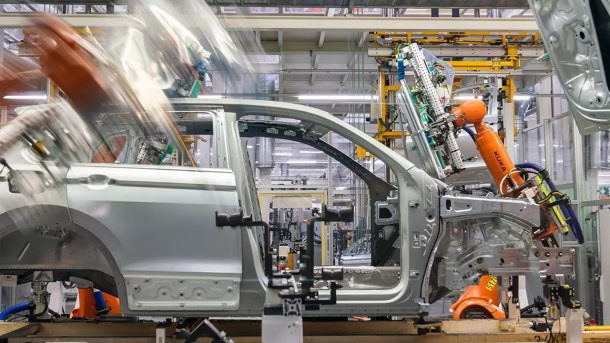Electric cars: skills shortage a major challenge for the automotive industry
What are the biggest challenges in the transformation of the automotive industry? The VDE asked experts from business and politics about this.

Car production at Volkswagen.
(Bild: Volkswagen)
Considering the current transformation of the automotive industry, experts from the industry and politics consider Germany to be a satisfactorily competitive location. In addition to productivity, the shortage of skilled workers is the greatest challenge, according to the Association for Electrical, Electronic & Information Technologies (VDE) in discussions with 30 executives from car manufacturers, suppliers, battery producers, research and development and specialist politicians. The VDE started from the premise that electric vehicles will dominate the market in the future.
The industry has been doing very well in Germany recently, but has lost competitiveness as interest rates and energy prices have risen and foreign competition has become stronger. The industry needs to catch up, particularly in the core areas of software and battery technology. "Manufacturing processes must be radically redesigned, including through more automation," writes the VDE in its study Automobilstandort Deutschland 2035 (PDF).
Important China
The industry urgently needs to develop solutions for e-cars for the mass market in particular. "Otherwise, vehicles from this segment will mainly come from China by 2035," the study states. China also plays an important role in the supply of raw materials for the German automotive industry. China currently covers 80 percent of the demand for rare earths. The industry has to diversify these and other sources of supply.
According to the experts, professional requirements will also change significantly as production changes. Digital skills are important, for example knowledge of programming languages, software architecture and data science for the development of autonomous driving. "The demand for these job profiles exists across all industries, and competition is correspondingly high," writes the VDE. The disadvantage for the automotive industry is that young people in particular are looking at them in the discussion about climate protection and Dieselgate.
Germany not sufficiently attractive
One way out of the shortage of skilled workers could be the immigration of qualified personnel, although the experts argue that Germany does not appear to be sufficiently attractive at the moment. The USA is currently attracting more skilled workers from India, South Africa and Australia. In addition to automation, other levers to combat the shortage of skilled workers include the switch from part-time to full-time work, as well as further training and incentives to attract students in STEM subjects.
"Although the German automotive industry has largely recovered financially from the diesel scandal, it has never completely got rid of the image stigma", Ralf Petri explained, Head of the Mobility Division at VDE. Electromobility and sustainable transport solutions offer the opportunity to emphasize the role of technology not as an obstacle, but as a solution to ecological challenges. People need to be won over to new forms of mobility such as ridesharing or autonomous driving, and fears need to be allayed.
The EU should pursue an industrial policy similar to that of the USA and China, which massively subsidize their key industries, demand the representatives from industry in the VDE study. Germany is expected to have sufficient renewable energy at reasonable prices by 2035. In the transformation phase until then, companies must be given targeted support.
(anw)